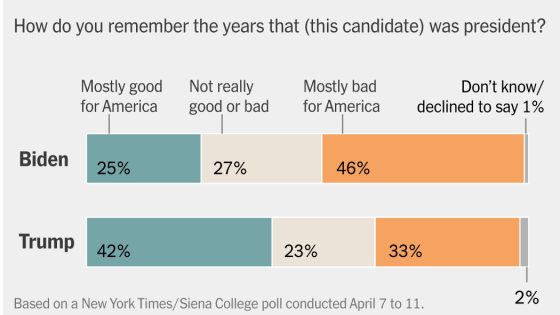Views of Donald J. Trump’s presidency have become more positive since he left office, bolstering his case for election and posing a risk to President Biden’s strategy of casting his opponent as unfit for the presidency, according to a new poll by The New York Times and Siena College.
While the memories of Mr. Trump’s tumultuous and chaotic administration have not significantly faded, many voters now have a rosier picture of his handling of the economy, immigration and maintaining law and order. Ahead of the 2020 election, only 39 percent of voters said that the country was better off after Mr. Trump took office. Now, looking back, nearly half say that he improved things during his time as president.
The poll’s findings underscore the way in which a segment of voters have changed their minds about the Trump era, recalling those years as a time of economic prosperity and strong national security. The shift in views about his administration comes even as Mr. Trump faces dozens of felony counts and will appear in a New York courtroom on Monday for jury selection in one of his four criminal trials.
Many voters still remember Mr. Trump as a divisive and polarizing figure, giving him low ratings on race relations and unifying the country. Yet, a larger share of voters see Mr. Trump’s term as better for the country than the current administration, with 42 percent rating the Trump presidency as mostly good for the country compared with 25 percent who say the same about Mr. Biden’s. Nearly half say the Biden years have been mostly bad for the country.
Many of Mr. Trump’s key constituencies, such as white voters without a college degree, are particularly likely to have a fond view of his time in office. But a broad swath of the country — including Hispanic voters, voters over 30 and most lower- and middle-income voters — now see Mr. Trump’s years in office as more good than bad.
Maya Garcia, 23, described herself as a former “Trump hater.” But now, she says, she has come to believe that Mr. Trump’s contentious style helped control crime and maintain order in the country.
“When he was first running, I was, like, what is this guy even yapping about? Like, what is he even saying? Like, he’s saying all the wrong things,” said Ms. Garcia, a restaurant worker from Canoga Park, Calif. “But to be honest, if you look deep into his personality, he actually cares about the country.” She added: “You know at first I didn’t like it. But sometimes we need that type of person in our lives.”
Ms. Garcia voted for Mr. Biden four years ago but has been unhappy with his handling of the border, crime, mental health and the rising cost of living. She plans to back Mr. Trump in November.
The shift in the perception of Mr. Trump is not unusual: Presidents are typically viewed in a better light after leaving office. President George W. Bush’s average approval rating while in office was 49 percent; voters now give him a 57 percent approval rating for his time in the White House. And President Barack Obama received a 15 percentage point bump after leaving the White House, according to Gallup.
What’s unusual about the 2024 race is that Mr. Trump is running again, transforming sentiment about his presidency into a salient and potentially influential voting issue.
Some of the changed opinions about Mr. Trump may stem from his diminished visibility. Since leaving office, Mr. Trump has faded some from public view, spending the bulk of his time at Mar-a-Lago, his private club and residence in Palm Beach, Fla., and at court hearings. He dominated the Republican presidential primary without participating in any debates; his social media posts on his own platform get less attention than they did on Twitter; and while he still holds large rallies, they are not covered to the same extent as his previous campaigns.
The most improved views of Mr. Trump center on the economy, with several voters saying they have struggled to keep up with higher costs and increased inflation during Mr. Biden’s presidency.
Marecus Maupin, 41, said he now looked back at the Trump years as a time of economic prosperity, even though he is making more money with Mr. Biden as president. He voted for Mr. Biden and now plans to back Mr. Trump.
“We all had a little bit more money in our pockets when he was in office. I think he gave out more money than any other president that I have had in my lifetime,” he said of Mr. Trump. “It now feels like, although I’m making more, I’m not seeing it.”
When asked the one thing they remembered from Mr. Trump’s time in office, a vast majority of positive comments referred to the state of the economy. Many specifically remembered the stimulus checks with his signature printed on them that were sent to tens of millions of Americans during the waning days of his presidency.
Still, large segments of the electorate’s recollection of Mr. Trump’s presidency remain unchanged. Views of his handling of the Supreme Court are nearly identical to 2020, and Mr. Trump’s low approval ratings for unifying the country remain fairly similar. The bulk of negative comments about Mr. Trump’s time in office from participants mentioned the former president’s personality and behavior.
“He’s horrific. He’s a narcissist. He’s dishonest. He’s a misogynist,” said Dodee Firestone, 74, a Biden supporter from Boca Raton, Fla. “I could never, ever, ever vote for Trump.”
But other voters said that while they disapproved of Mr. Trump’s inflammatory style, they wondered whether they had placed too much emphasis on his personality in past elections.
While 70 percent of participants said that Mr. Trump had at one point said something they found offensive, those statements were a distant memory for many. Nearly half of that group said he had not said anything offensive recently. Young voters were especially likely to say it had been a while since Mr. Trump said something they found offensive.
President Biden has devoted a significant portion of his campaign to reminding voters of some of Mr. Trump’s most inflammatory statements and failed policies, particularly regarding his handling of the coronavirus pandemic and controversial comments about Black and Hispanic voters.
And while the issue of abortion rights has been front and center in the general election campaign, less than 2 percent of voters mentioned abortion or Mr. Trump’s role in the Supreme Court’s repeal of Roe v. Wade as the main thing they remember from his presidency.
Some of the visceral fear about Mr. Trump’s presidency also seems to have faded. In October 2016, 40 percent of voters said they were scared of what Mr. Trump might do if elected. Now, 31 percent say they are scared.
Nearly identical shares of voters also say both Mr. Trump and Mr. Biden would be a risky choice for the country.
Angie Leon, a 23-year-old Mexican American, said she never liked how Mr. Trump talked about Latinos. But looking back, she wonders whether Mr. Trump’s incendiary remarks about immigrants and building a border wall were just a political tactic to bolster his campaign. After backing Mr. Biden in 2020, she plans to switch her vote to Mr. Trump in November.
“I felt like it was just his marketing, in the way that he would get the attention of people,” said Ms. Leon, a human resources recruiter from Gilroy, Calif. “The country was better when he was running it, despite his comments toward the community.”
Camille Baker contributed reporting.
Here are the key things to know about how this Times/Siena poll was conducted:
-
We spoke with 1,059 registered voters from April 7 to 11, 2024.
-
Our polls are conducted by telephone, using live interviewers, in both English and Spanish. More than 95 percent of respondents were contacted on a cellphone for this poll.
-
Voters are selected for the survey from a list of registered voters. The list contains information on the demographic chara cteristics of every registered voter, allowing us to make sure we reach the right number of voters of each party, race and region. For this poll, we placed nearly 127,000 calls to more than 93,000 voters.
-
To further ensure that the results reflect the entire voting population, not just those willing to take a poll, we give more weight to respondents from demographic groups underrepresented among survey respondents, like people without a college degree. You can see more information about the characteristics of our respondents and the weighted sample on the methodology page, under “Composition of the Sample.”
-
The poll’s margin of sampling error among registered voters is plus or minus 3.3 percentage points. In theory, this means that the results should reflect the views of the overall population most of the time, though many other challenges create additional sources of error. When computing the difference between two values — such as a candidate’s lead in a race — the margin of error is twice as large.
You can see full results and a detailed methodology here. If you want to read more about how and why we conduct our polls, you can see answers to frequently asked questions and submit your own questions here.
Source Agencies



